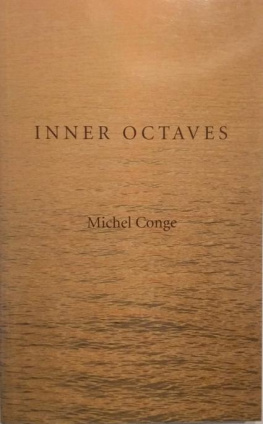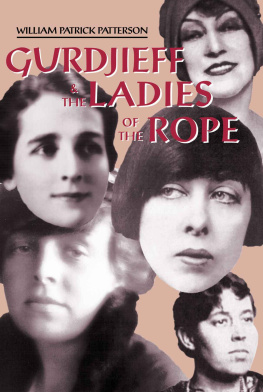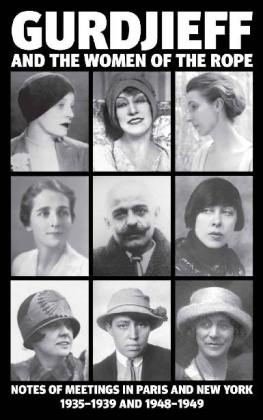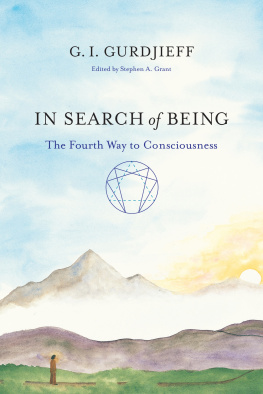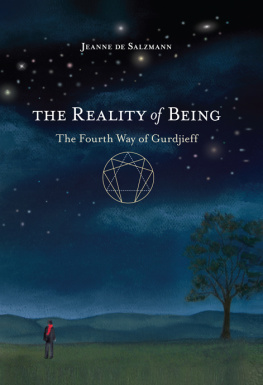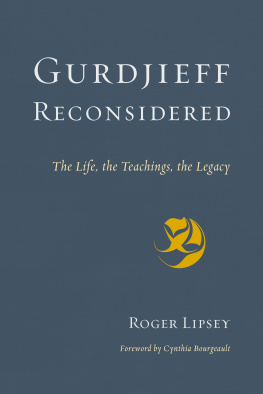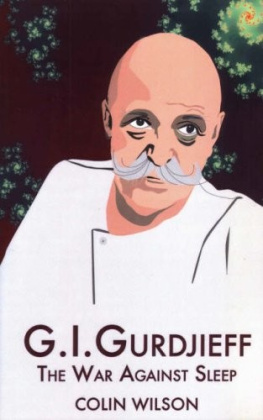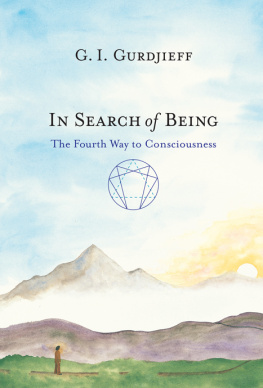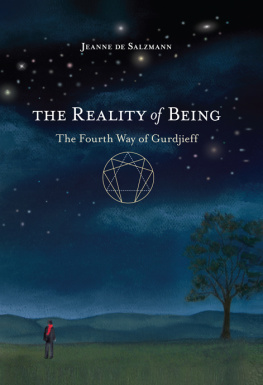

INNER OCTAVES
Michel Conge
DOLMEN MEADOW EDITIONS
Toronto
This book is a translation of
Sur le chemin de l'octave de l'homme: Tmoignage d'un lve de G.I. Gurdjieff
by Michel Gonge.
Copyright Socit dtude des Traditions, Paris, 2004.
Translated from the French by members of Gurdjieff Foundation groups in Europe and North America.
Inner Octaves
Published with the permission of the Socit dtude des Traditions.
English text Copyright Dolmen Meadow Editions, Toronto, 2007.
Photographs Copyright Socit dtude des Traditions, Paris, 2007.
Back-cover photograph: Michel and Gilles Conge at Le Lesiau.
ISBN: 978-0-97806611-6
All rights reserved. No part of this book may be reproduced, stored in a retrieval system, or transmitted in any form or by any means, without the prior written permission of the publisher.
DOLMEN MEADOW EDITIONS
283 Danforth Avenue, Suite 119
Toronto M4K IN2, Canada
www.dolmenmeadoweditions.com
dolmen a silent marker of the invisible
Printed and bound in Canada by Transcontinental Printing.
Everything moves out from the One
in order to return to the One.
Notice to the Reader
The passages in this book originated, for the most part, in convivial and provocative exchanges between Michel Conge and his students. Although not intended for publication, they constitute a record of his thought.
Reading these passages assumes a familiarity with the ideas brought by Mr. Gurdjieff as revealed in both In Search of the Miraculous .
However, memorized knowledge of these ideas alone is not enough to enter into an understanding of this book. As Michel Conge said, I will speak especially to those who have been searching for several years, or at the very least for several months, and who, having become acquainted with this teachings essential ideas, have felt their truth.
In this search, an understanding of the whole body of the ideas brought by Mr. Gurdjieff is inseparable from the practice of an inner discipline, a discipline in which the intelligence of the heart can only be awakened when the body is transparent to the energy of an intelligence from another world.
On this path of the opening of inner being to its own true destiny to be Man the seeker unfailingly encounters traces of the great teachings and authentic religions. As Henri Tracol used to say to us,
What are the hidden connections between our teaching and the great currents of the traditions? The kinship is unmistakable, a deep kinship ... but what is its nature? We need only remember that the Fourth Way cannot possibly be reduced to, nor be in opposition to, any of the other ways. On the contrary, it circulates freely whenever the dimension of consciousness allows seeming contradictions and incompatibilities to be transcended.'
While it is always risky to gather together notes of things that have been said over a period of some twenty years and under different conditions, as we looked through them, their coherence, the rigour of their intent, and the thread of the authors essential thought seemed to us to justify this collection, which resonates with the question asked of the Almighty by David in the Psalms: What is man that You remember him and the son of Adam that You are concerned for him?
Michel Conge constantly returned to the idea of man his origin, his freedom, his role, what is expected of him and what the conditions of his response are to the mystery of his own being and the mystery of having received life from what is beyond him. By his own example, Michel Conge constantly revivified these ideas, both by shedding light on them and by encouraging his students to put them into practice.
The assertion by King David, For thou hast made him a little lower than the Elohim, reminds us of mans origin from on high. This idea is found again and again in all the great traditional teachings, to which Michel Conge here brings his own voice.
We should also add that Michel Conges voice did not lack humour, as can be seen in some of his responses and in the tale of the trip to Vichy with Mr. Gurdjieff. I greatly mistrust teachings where people dont laugh, he used to say ... to which he would offen add, and other teachings too, by the way. In this way, he allowed everyone the freedom to participate or not in a question.
The editors of the French edition

Michel Conge and students, late 1960s, at Le Lesiau
TALKS AND EXCHANGES
A Hierarchy of Understanding
My life and my death, my liberation or my downfall... these are not isolated things; they are continuous processes; they are consequences. Everything is combination or state.
It is in an organism undergoing constant reshaping, an organism destined for annihilation, that the imperishable I must be born.
My aim can only be achieved by following an extremely rigorous line. If the descending current carries me away, I am taken farther from that line; if I deviate, I move away, along a loop that will lead me lower down.
My old illusion of being an accomplished and free man prevents me from seeing that, in fact, I am nothing more than a ceaselessly moving point where lines of force intersect.
This perspective on things is the only one that can really show me the right way to work. But, because it is so difficult for us today, we might try to look for a more modest understanding that could gradually lead us to the right way of working.
ln order not to deviate, I must learn to recognize the ideas that will enable me to encompass an increasing number of concerns and data in a single look. That will help me discover that deviation begins in the moment I take a single idea or a single phenomenon for the whole. And yet, my very constitution obliges me to do just that, and when I turn toward the longed-for truth with only one of my functions, I deviate immediately. A search supported by the head alone can only lead me astray; a search based solely on feeling leads to equally meaningless notions.
Only by reaching a centre of gravity in myself that is capable of reconciling my different aspects will I be able to keep to a precise line without deviating.
Just as I lose myself because I surrender to whatever function is dominant, similarly, I lose myself if I think that my vision of things is the only right one.
My centres must contribute to my search, without any of them claiming to be the only one able to understand.
Each one of us must draw closer to the others without claiming to be the only one who understands . Just as one centre will watch over another, so too will each of us watch over the other.
But that can never be enough. In order not to deviate, I must recognize in myself a hierarchy of levels. Likewise, among us we have to recognize a hierarchy of understanding. In this way, little by little, a relationship will be achieved.
The Idea of Evolution
I will not attempt to reassemble all the material that we have received, but will only bring out some essential elements. My aim is to try to share with you my deep interest in this question. To do that, I would like us to make the effort to approach this idea together, as if from within ourselves.
I am convinced that at a given moment it becomes impossible for any man to go beyond certain thresholds in his inner effort, if he does not allow a particular knowledge, which is as much psychologicai as it is cosmic, to penetrate his being. However, this knowledge has not been transmitted to us as an organized whole, but in a fragmentary manner. One of the great tasks that can fall to us would be to reconstitute the body of ideas on which this teaching is based.
Next page
